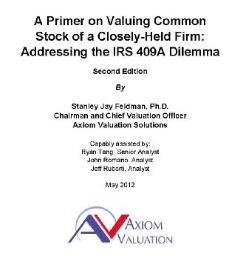
A Primer on Valuing Common Stock of a Closely-Held Firm: Addressing the IRS 409A Dilemma

By Stanley Jay Feldman
This Primer is organized in the form of questions that company Boards often ask when considering establishing the value of their common stock for purposes of setting the strike price for employee stock options consistent with the fair value standard, Topic 820 formerly Financial Accounting Standard 157, and the requirements of IRS 409A. The 409A valuation issue is related to whether an employee received a stock option award where the strike price was set at a level below fair value, so the intrinsic value of the award is greater than zero. To the extent that this is the case, the award is no longer treated as deferred compensation since the employee has an immediate gain; the difference between the fair value and the below fair value strike price. Establishing the fair value strike price, as it turns out, is no trivial matter. In most instances the firms needing to have their common stock valued have capital structures that include common stock and one or more series of convertible preferred stock. The essential exercise for valuing the common stock is to first determine the total value of equity and then determine the percentage of equity allocated to the components of the capital structure―various series of preferred, common, warrants, and options. The AICPA has established guidance for this allocation based on contingent claims modeling.

